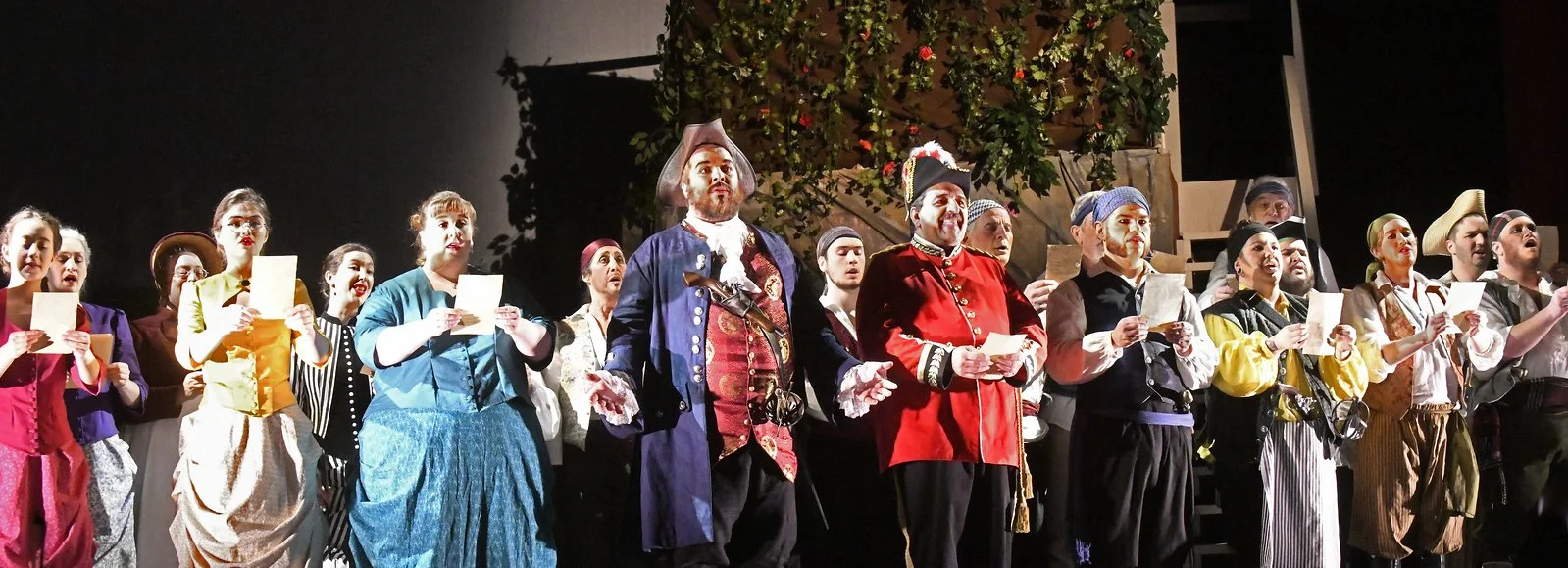The Gilbert and Sullivan Society of Maine’s presentation of “The Pirates of Penzance” ended its run this weekend at the iconic Grand Theater in Ellsworth. And, we were there with a buccaneer-friendly camera.
The show is one of the cleverest and most loved creations of the famous British team of W.S. Gilbert (lyricist-dramatist) and Arthur Sullivan (music composer). It takes place in the port of Penzance on the west coast of England, an unlikely pirate lair.
This two-act comic opera, also called “The Slave of Duty,” premiered in New York City in 1879, the only G&S operetta to premiere in this country. It opened in London in 1880. A very condensed and inadequate summary of the opera follows.
Act I begins with the notoriously soft-hearted (therefore unsuccessful) pirates being called together by their tough-talking (but gentle-acting) “Pirate King” (Pepin Mittelhauser) at their beach in Penzance.
Frederick (Zachery Field), an “indentured pirate” who was apprenticed to the crew since his childhood, has reached 21 years of age and is about to be formally liberated from piracy, pursuant to the indenture agreement. The pirates don’t like this development.
Ruth (Debra Hangge) then makes her presence noted. She’s Frederick’s 47-year-old nursemaid-nanny who has been with him since his infancy. She’s also the only woman whom Frederick has seen closely; she wants to share Frederick’s free life with him, even romantically. After a hilarious duet about age differences and beauty, Frederick decides to play the field and find out whether other women are as beautiful as Ruth.
All of a sudden, there are sounds of laughter and a number of young woman burst onto the secluded scene. It’s then that an excited Frederick realizes that there are women who are more beautiful than Ruth.
It turns out that these women are the unmarried daughters of Major-General Stanley. The most attractive of the daughters makes a late, dramatic appearance alone. Her name is Mable (Celeste Mittelhauser). She enchants young Frederick and their hilariously indiscrete actions shock Mabel’s sisters.
The pirate crew suddenly appears. They capture the sisters and say that they intend to marry them. But, the father of the young women — the Major-General (Roland Dube) — enters authoritatively. He’s ridiculously pompous and sings one of the most famous, satiric, and difficult arias in comic opera: “I Am the Very Model of a Modern Major-General.” He demands that the pirates let his daughters go.
The pirates refuse to free the women and capture him. Then, remembering how soft-hearted the pirates are, the General falsely pleads that he is an orphan and alone in the world, except for his daughters. That does it; the teary-eyed pirates let the women go and Act I ends with everyone happy.
Act II opens with the General being unable to sleep; his conscience bothers him due to his having lied to the pirates. He roams a ruined chapel on his estate and his daughters comfort him. Everyone is in bed clothes. The General says that he will reveal the truth and Mabel convinces the local cowardly constables and their officious Sergeant (Maurice Joseph Marshall) to protect them from the pirates.
Nonetheless, in a clever plot twist that will not to be disclosed here, the pirates find out through Frederick that the General lied to them. They attack the family. The constables flee and hide; the General cavorts hilariously in his nightgown; the constables come back to help and are defeated by the pirates, and the General and his daughters are captured.
In the zany finale, the constables point out that they were serving under Queen Victoria and ask that the successful pirates yield in her name. The soft-hearted pirates revere the Queen as do all Englishmen and, of course, they set free the General, his family, and the constables. The General and constables then “capture” the pirates and, all of a sudden, the pirates are waiving British Union Jack flags as they surrender.
But wait — Ruth (the nanny) yells that all the pirates really are “noblemen who have gone wrong.” That changes everything, of course. The General forgives the pirates and says that they may marry his daughters since they are noblemen.
Everybody is satisfied, including the audience.




























